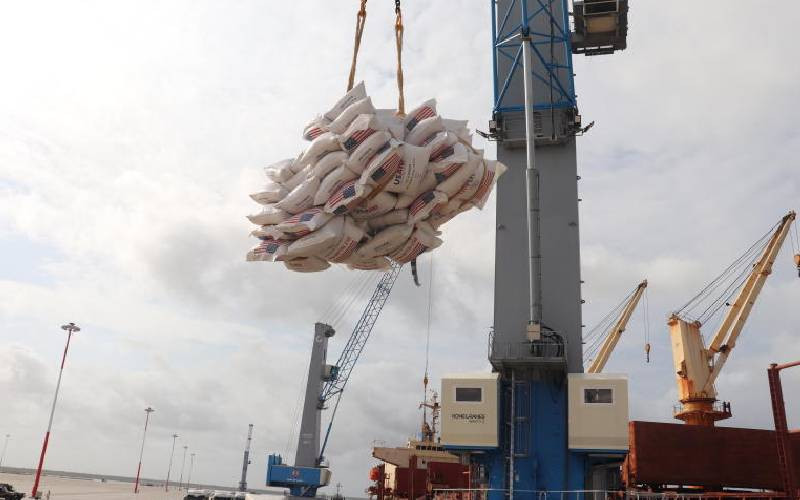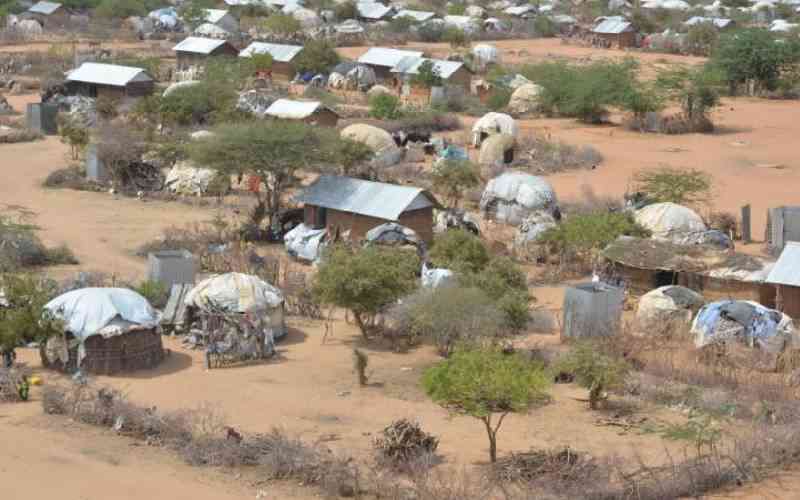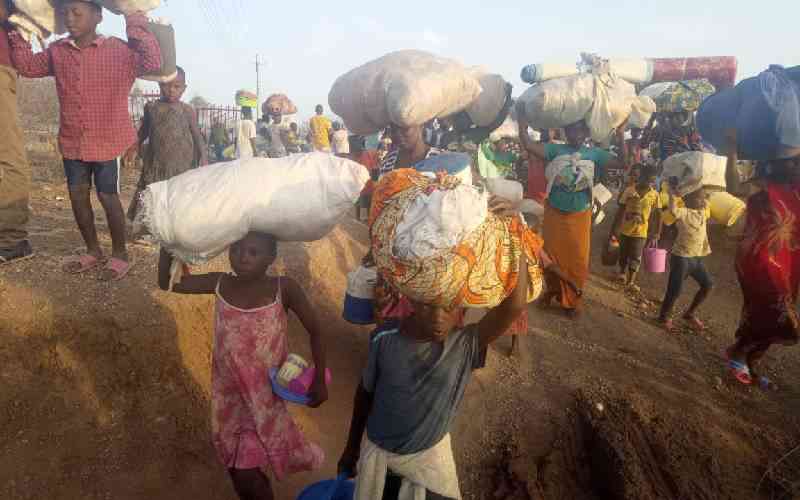 |
|
Grace Safi, a Congolese national sells fish at Kakuma Refugee Camp. [PHOTOS: VINCENT BARTOO/STANDARD] |
By SILAH KOSKEI
KAKUMA, KENYA: When you mention the word refugee, the image that comes to mind is one of a helpless, bedraggled person who relies on Good Samaritans for food, water, shelter and clothing.
This is partly true.
However, it is a known fact that most refugees do not merely sit back, palms on their cheeks, waiting for hand-outs from well-wishers.
Most of them roll up their sleeves and do all manner of jobs, determined to improve their lives.
This in no different with most of refugees in Kenya — those who fled intense fighting in their countries and found a new home in our midst.
In some cases, their presence here has been a blessing in disguise.
A visit by The Standard to Kakuma camp, which hosts over 130,000 refugees, confirms this. Enterprising refugees at the camp have started businesses, some of which are booming, benefiting not only themselves but also fellow refugees and the host Turkana community.
Safi Grace is a fish monger at the camp and has been reaping big from the business she started with her husband two years ago.
“We fled to Kenya in 2011 from Democratic Republic of Congo after fighting broke out. To make ends meet, we started a hotel business before shifting to fish selling,” Safi says.
She says the business picked up steadily, thanks to the cordial relations between the host community and refugees that provided a conducive environment for her business to thrive.
Safi says her ties with the host community enables her to acquire fish at a reasonable price, which she in turn sells in the open-air market.
The proliferation of shops and open-air markets within the camp has brought a sense of belonging to majority refugees, who fled their countries in search of peace, and also provided a social integration avenue that spurs the local economy.
Center Megu, a South Sudan refugee, owns a sorghum shop at the camp. Megu fled his home country in 2000 alongside his parents.
Megu is happy with the idea of allowing refugees to venture into business to help their families and supplement the food rations provided in the camp.
Stay informed. Subscribe to our newsletter
“Since I started the business, the host community and fellow refugees have been very supportive. There has been no discrimination. This is my second home and we will ensure that we maximise opportunities to our advantage. We are simply home away from home,” he adds.
Megu, an alumni of the nearby Kakuma Secondary School, pays glowing tribute to the Kenyan government, UNHCR and other organisations that help them in the camp.
DOMINOES GAME
“Our comfort has been realised due to the great hospitality of the hosts and neighbours in the camp. Our worries are no more and harmony and unity have replaced the bad blood that existed with our enemies back home,” he says.
Megu says the environment at the camp and the business opportunities has turned former foes like the Dinka and Neur into friends.
“During free time we play dominoes with our friends to refresh our minds and boost mathematical power,” he explains.
Vincent Lobwin, a Kenyan, also sells dried fish to the refugees at the camp.
Lobwin says there is minimal business competition, due to the large number of customers (refugees) at the camp.
Lobwin reveals that fish business picks up every time refugees are given food rations as most of them would want to supplement the food with other foods.
He went on: “Our friends are normally given rations two times a month and their preference is to buy other food items in order to feed their families.”
Ewoi Joseph, a boda boda operator, who operates within Kakuma camp and its outskirts, attributes the steady business growth to the harmonious existence between the host community and the refugees.
“There is no conflict or perception that they are foreigners. Their presence has been a blessing to the community who mingle with them freely,” he says.
SOCIAL FABRIC
He notes the interaction between the two groups has enabled cross-cultural sharing and, co-existence of different cultures at the camp.
Kakuma camp immigration manager Abdi Abdulahi said the refugees live in harmony and their business success has further strengthened the social fabric of the different groups.
“A good example is the Dinka and Nuer. Due to stringent rules in the camp, many have developed ways of forgiving each other and promoting income through establishment of various businesses,” he adds.
He says the community has embraced inhabitants who are expected to adhere to rules of the land and co-exist.
 The Standard Group Plc is a
multi-media organization with investments in media platforms spanning newspaper
print operations, television, radio broadcasting, digital and online services. The
Standard Group is recognized as a leading multi-media house in Kenya with a key
influence in matters of national and international interest.
The Standard Group Plc is a
multi-media organization with investments in media platforms spanning newspaper
print operations, television, radio broadcasting, digital and online services. The
Standard Group is recognized as a leading multi-media house in Kenya with a key
influence in matters of national and international interest.
 The Standard Group Plc is a
multi-media organization with investments in media platforms spanning newspaper
print operations, television, radio broadcasting, digital and online services. The
Standard Group is recognized as a leading multi-media house in Kenya with a key
influence in matters of national and international interest.
The Standard Group Plc is a
multi-media organization with investments in media platforms spanning newspaper
print operations, television, radio broadcasting, digital and online services. The
Standard Group is recognized as a leading multi-media house in Kenya with a key
influence in matters of national and international interest.









